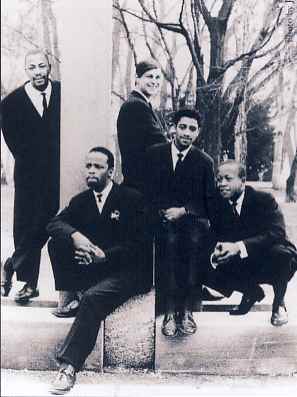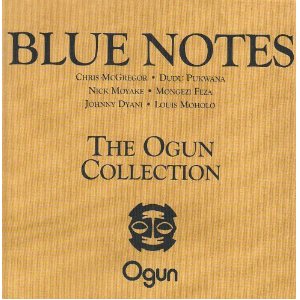BLUE NOTES / Blue Notes Mixtape
Exile is hard. Harder than hard. Exile deforms, maims, kills the person who is pulled away from their roots and forced to attempt growth in a foreign land and culture. The food is not the same, both the physical food and the spiritual food. People drive differently, on the wrong side of the road; oh, and the words they use, especially the words they speak even to your face to tell you who they think you are, even friends and lovers can hurt with a few callous or careless utterances. Exile. It’s not a pretty picture. In 1964 a sextet of young jazz musicians left apartheid South Africa. They were all black except for the pianist. They were an integrated group and therefore banned from publicly performing in South Africa. They were Mongezi Feza on trumpet, Dudu Pukwana on alto sax, Nick Moyake on tenor sax, Chris McGregor on piano, Johnny Dyani on bass, and Louis Moholo on drums. Only one of them, Moholo, survives today. They had been invited to a jazz festival in Antibes, France, which led to other opportunities. For five of them the lure of practicing and performing their art internationally was stronger than the pull to return home; Moyake fell ill with a brain tumor and went back (he died in South Africa in 1969). While work was sporadic as a South African jazz quintet, they each made their marks as innovators on their instruments.

Those were difficult days in the late sixties. They were jazz men and foreigners working in a competitive environment of struggling artists. Their exuberant music was lauded as distinctive but they were also shunned aside as too different; being African in Europe has never been easy. Their music reflected both their expertise and their unease.
Although they are considered the greatest jazz ensemble South Africa has produced, recordings of the group at work are rare. The five CD box set, The Ogun Collection, on London-based Ogun Records is the most extensive documentation available that illustrates the strengths of and the severeties suffered by this exiled band. Only the first of the five CDs, Legacy-Live In South Africa 1964, features the full original sextet and it was informally recorded mere months before they left on their foreign travels. The music is decidedly post-bop in the vein of the famous American-based jazz label Blue Note Records. You can hear the influence of John Coltrane’s 1957 Blue Train recording and even the landmark 1959 Miles Davis Kind Of Blue recording. All these blues are no accident. As joyful and life-affirming as their music sounds, at the core of their sonic expressions burns a blue flame of pain, of suffering, but also of resistance and determination to survive and succeed against the odds.On the fourteenth of December 1975 Mongezi Feza died. On the twenty-third of December the four remaining members came together in a studio in London and without rehearsal, or charts, or even any previous discussion they played straight through for three and a half hours. What did they play? Blue Notes For Mongezi is what the document is called. They played their lives, their loves, their struggles, their memories of their dear brother. Sometimes they sang, sometimes they shouted (literally), themes arose and receded, erupting from the sea of their experiences and the emotions those experiences engendered. It was a singular, artistic achievement.
The third and fourth CDs are of the surviving quartet of Pukwana, McGregor, Dyani and Moholo performing a gig in London at the 100 Club on sixteenth of April 1977. Although they were internationally recognized as modernists most of the music on this session are adaptations of traditional South African music, altered and re-cast in a jazz mode but roots-based nonetheless. The fifth and final recording was another eulogy, this time for the recently departed bassist Johnny Dyani who died on October 25, 1986 in Berlin, Germany. Appropriately, the three remaining members gathered themselves to do a tribute recording the following year on August 18, 1987 in London.The core four members Pukwana, McGregor, Dyani and Moholo recorded extensively either with ensembles that they individually led or as sidemen with other musicians but unfortunately there are no other major recordings of the group after they left South Africa in 1964. There is one recording, Township Bop, from 1964 as the band was in formation and features Pukwana compositions in the main.
The impact and influence of the Blue Notes far exceeds their meager recorded output. Although their major recordings were not done as a group, but rather as individuals working within other context, nevertheless together or apart, they represented a major achievement in jazz. They achieved legendary status internationally in a USA-dominated cultural artform.There are not many (if any) non-American jazz bands that have had a similar impact and certainly no non-American ensemble that has achieved the same artistic success. That they were South African marks them as even more of a rarity. As the most industrialized country on the African continent, and as the most racist, the South African experience is concordantly closely aligned with the USA experience, thus it should be no surprise that jazz from South Africa is not only distinctive but also is analogous in both impact and individual expression as the American artform.
In a sense they might be considered siblings separated only by circumstance of birth place or, at the very least, close cousins who share common experiences under different but congruent racial conditions. Jazz is 20th century expression based on a collision of cultures and economic forces under a western and racist political regime. Although born in the United States of America, it is really not surprising that jazz also flowered in a place once also known as the USA, i.e. the Union of South Africa.
Blue Notes. Considering the social conditions. It makes sense and sound, soundly so.—Kalamu ya Salaam
Blue Notes Mixtape Playlist
 The Ogun Collection
The Ogun Collection
Legacy
01 “Now”02 “I Cover The Waterfront”
03 “Vortex Special”04 “B My Dear”
Blue Notes For Mongezi
05 “Second Movement”
Blue Notes In Concert
06 “Kudala (Long Ago) > Funky”
Blue Notes For Johnny
07 “Boots Blues For Nick”
08 “Funk Dem Dudu > To Erico”
This entry was posted on Monday, May 21st, 2012 at 10:17 am and is filed under Classic. You can follow any responses to this entry through the RSS 2.0 feed. You can leave a response, or trackback from your own site.
One Response to “BLUE NOTES / Blue Notes Mixtape”
May 29th, 2012 at 3:24 pm
i cover the waterfront is beautiful. i hear a lot of trane, newk, blakey and mingus all up in these guys and i hear a lot of ideas that totally belong to these guys as well. they dont appear to be interested in copying anyone, but are merely in pursuit of extending the tradition.
Leave a Reply
| top |